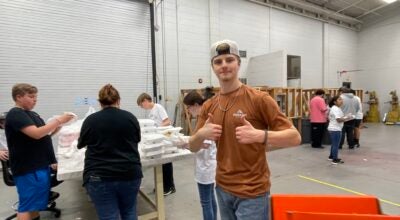All about the love bug
Published 6:33 pm Friday, September 30, 2016
By Ty Torrance
Fall is a great time of year. The sky is blue, the temperatures are cooler, and love bugs are in the air. You have probably noticed a lot of black bugs flying around lately that appear to be “wrestling”. The love bug has many nicknames; honeymoon fly, telephone bug, kissy bug, and double headed bug.
The love bug is a small black fly with a red thorax. Males are ¼ inch and females are ¼ inch in length. Two flights of love bugs occur each year. The spring flight occurs during late April and May. The second flight usually occurs during late August and September. Flights extend over periods of 4 to 5 weeks. Mating takes place almost immediately after emergence of the females. Adult females live only 2 – 3 days. Love bug swarms can number in the hundreds of thousands.
Love bug larvae grow up in grassy areas and feed on dead vegetation. Love bugs are a type of fly, and their life cycle follows that of most any insect. They are hatched from eggs which turn into larva, and then pupate to hatch out as flying adults. Love bugs thrive in an environment that is wet, damp, and humid. After that statement, you should not have to guess why they like Southwest Georgia. Eggs are laid on decaying vegetation so landscaping around homes can present some prime food plots for love bugs. Mulch, compost, and flower beds will all contain the very food and moist conditions females seek when they are looking to lay eggs. Female love bugs can lay 100 to 350 eggs, depositing them beneath decaying vegetation. Larvae perform a beneficial function by converting the plant material into organic components which can again be used by the growing plants.
The adult love bug does not eat, but subsists on the food taken in during its larval stage. As flying adults, this insect only has 2-3 days to live. Although, you might think their only purpose is to cover the grill of your car you had washed yesterday; it is actually to find a mate and reproduce so another flight can happen this spring.
If you have any questions, please feel free to call The Extension Office at (229) 248-3033.




